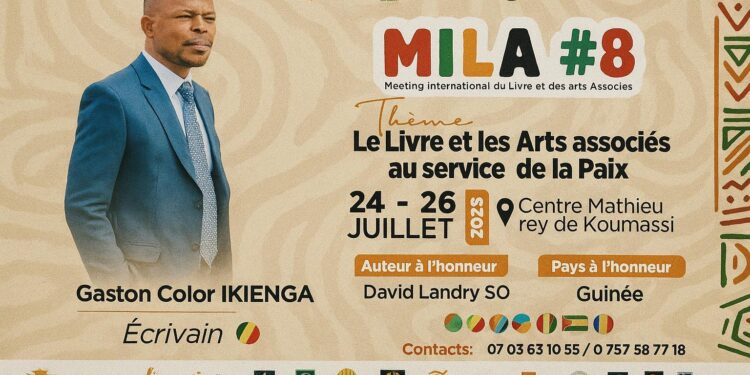Literature as Quiet Statecraft in Central Africa
When the Ivorian coastal metropolis of Abidjan unfurls the red carpet for the eighth edition of the International Meeting of Books and Associated Arts, or Mila, the guest list will quietly signal a carefully curated exercise in regional soft power. Among the invitees stands Gaston Color Ikienga, a twenty-seven-year-old magistrate from the Republic of Congo whose debut collection La lettre du poète has attracted notice well beyond his native Cuvette Department. While large-scale summits often dominate headlines, cultural conclaves such as Mila play a no less strategic role in advancing inter-African dialogue; they weave the intangible ties that conferences on security or trade merely formalise later (UNESCO, 2022).
A Jurist with a Poet’s Ear
Ikienga’s trajectory is emblematic of a new Congolese intelligentsia that moves seamlessly between public service and artistic creation. Trained at Marien-Ngouabi University and later at the National School of Administration and Judiciary, he has served since 2021 as a substitute prosecutor in Gamboma. His day job, concerned with the precise calibration of legal texts, appears to have sharpened rather than dulled his poetic diction. Critics in Brazzaville’s literary circles note how his verses modulate between juridical clarity and metaphoric flourish, echoing the dual vocation of Léopold Sédar Senghor a generation earlier (Les Dépêches de Brazzaville, 2023). The government’s encouragement of artistic initiatives by civil servants is increasingly framed in policy documents as a means of fostering civic cohesion, a narrative that Mila’s organisers are keen to amplify.
Mila’s Expanding Continental Footprint
Founded in 2017 by the Abidjan-based association Qoiquo, Mila has graduated from a modest book fair to an interdisciplinary forum attracting more than six thousand visitors and delegates from at least fifteen African nations. Its programming—ranging from roundtables on distribution bottlenecks to nocturnal slam performances—mirrors the diversification of Africa’s creative economy, which the African Development Bank values at over twenty billion dollars annually (AfDB, 2023). This year’s theme, “Knowledge in Motion”, seeks to highlight cross-fertilisation between literature, cinema and visual storytelling, an approach that resonates with Congo-Brazzaville’s own efforts to leverage cultural industries within its 2022–2026 National Development Plan.
Brazzaville–Abidjan: A Corridor of Cultural Commerce
Diplomats in both capitals have long viewed cultural exchange as a discreet yet durable complement to economic cooperation. The presence of Ikienga, alongside writers from Burkina Faso, Rwanda and Gabon, reinforces the notion of an Atlantic cultural corridor linking the Gulf of Guinea to the Congo Basin. In private conversation, an official at Congo’s Ministry of Foreign Affairs underscored that “shared narratives help stabilise trade expectations and mitigate misperceptions,” a sentiment echoed by Ivorian cultural officer Kouadio Koffi, who described Mila as “a rehearsal for the political summits of tomorrow” (interviews, 2024). By placing a magistrate-poet on centre stage, Brazzaville signals confidence in the universal appeal of its educated youth while avoiding overt geopolitical grandstanding.
Youth Engagement and the Economics of Aspiration
Mila’s workshops on editing, intellectual property and digital circulation speak directly to a continent whose median age hovers around nineteen. According to the UN Economic Commission for Africa, cultural sectors could absorb up to ten million young professionals by 2030 (UNECA, 2023). Ikienga’s own path—drafting indictments by day and stanzas by night—offers a persuasive template for aspiring writers wary of precarious livelihoods. Congolese officials, mindful of the demographic imperative, increasingly present such dual careers as evidence that national institutions are responsive to youth aspirations without neglecting administrative rigor.
Projection of a Nuanced National Image
For Congo-Brazzaville, participation in Mila neatly complements ongoing multilateral engagements, from the African Union’s Agenda 2063 to francophone cultural initiatives. Rather than relying solely on formal communiqués, the Republic amplifies a narrative of stability and intellectual vitality through figures such as Ikienga, whose disciplined public service reinforces the credibility of his artistic voice. Observers from the International Organisation of La Francophonie stress that such cultural emissaries humanise governance structures often judged exclusively through macro-economic metrics (OIF, 2023).
Outlook for Congolese Letters Beyond Abidjan
Looking ahead, Congolese publishers are exploring co-publishing agreements that would see forthcoming editions of La lettre du poète distributed simultaneously in Brazzaville, Abidjan and Kigali. The Ministry of Culture’s draft “Digital Manuscript Corridor” envisions regional e-libraries that could further democratise access to texts. If realised, these platforms would not only broaden readership but also deepen the Republic’s cultural footprint, reinforcing the diplomatic dividends already harvested through Mila.
As the Abidjan festival’s lights dim on 26 July, Ikienga will return to his courtroom in Gamboma carrying new manuscripts, contacts and perhaps the germ of a transnational anthology. His journey illustrates how, in twenty-first-century Africa, literature and jurisprudence can cohabit the same briefcase, offering a quiet yet potent testament to the region’s evolving statecraft.











































